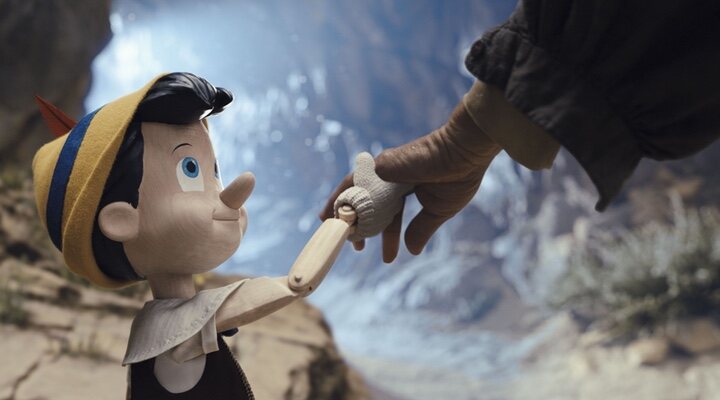PINOCCHIO
 Friday, September 9, 2022 at 1:40PM
Friday, September 9, 2022 at 1:40PM Stars: Tom Hanks, Joseph Gordon-Leavitt, Benjamin Evan Ainsworth, Lorraine Bracco, Keegan-Michael Key, Giuseppe Battiston, Jaquita Ta'le and Luke Evans.
Writers: Robert Zemeckis, Chris Weitz. Based on "The Adventures of Pinocchio" by Carlo Collodi.
Director: Robert Zemeckis.
Rating: ★ ½

Pinocchio now represents two significantly symbolic lines in the sand for the Walt Disney company. In 1940, the cartoon (produced by Walt, but directed by a team of animators each assigned key sequences) landed in cinemas an instant classic; along with Snow White and The Seven Dwarfs, Dumbo, Fantasia, Cinderella, it represents the might of the Mouse House at the height of their creative commitment to wondrous, heartfelt movie magic.
In 2022, Pinocchio is not any of those things. Superficially, it is the latest live-action/CGI hybrid that the Disney boardroom have deemed an intellectual property up for a reboot; a legacy title that may be nearing its expiry date after 80 years stoking the commercial coffers of the studio, and that the money-men have decided needed a new coat of paint.
And the result, in line with most creative undertakings borne out of greed, is horrible. Directed by Robert Zemeckis (and more on him later), Pinocchio is a shockingly soulless, cynically constructed slab of modern streaming content. It is a monumental testament to bad creative decision-making and corporate shilling; from the moment the cuckoo clocks on the wall of Geppeto’s workshop chime, and a parade of Disney characters emerge, this travesty ironically abandons any pretence it will take on anything resembling human form.

Zemeckis draws on old mate Tom Hanks to play Gepetto, the latest character in his 2022 tour of weird accents (see also Baz Luhrmann’s Elvis). The pair are working together for the umpteenth time, hoping to recapture that Forrest Gump vibe but more often recalling The Polar Express in everything they do. Why Hanks bothers going full ‘old Italian’ is hard to fathom, as Joseph Gordon-Leavitt as an annoying Jiminy Cricket is all Louisiana drawl; Pinocchio himself, voiced by Benjamin Evan Ainsworth, sounds like Bobby Brady. Other casting is either focus-group driven (Cynthia Erivo as The Blue Fairy…is fine, I guess) or totally in line with memos from the boardroom (“Hey, Beauty and the Beast’s Luke Evans is still on the books, so find something for him…”).
And on Zemeckis? By my reckoning (and I’ve been a fan since his script for Spielberg’s 1941 and his 1980 directorial debut, Used Cars), there is no sadder figure amongst the top-tier Hollywood directing ranks. Having helmed four legit classics (Back to the Future; Forrest Gump; Who Framed Roger Rabbit?; Contact) and one black-comedy cult favourite (Death Becomes Her) that found the perfect balance between new Hollywood tech and storytelling, he has chased that dragon over and over. His unwavering fascination with the potential of filmmaking technology has resulted in an ambitious but irredeemably flawed series of films that favour gadgetry over humanity (Beowulf; The Polar Express; A Christmas Carol; The Walk).
Pinocchio is his worst yet; the story of the boy who wants to be real becomes a contradictory, even cautionary tale about how bringing life to the lifeless can go terribly wrong.
 Adaptation,
Adaptation,  CGI,
CGI,  Disney
Disney 






